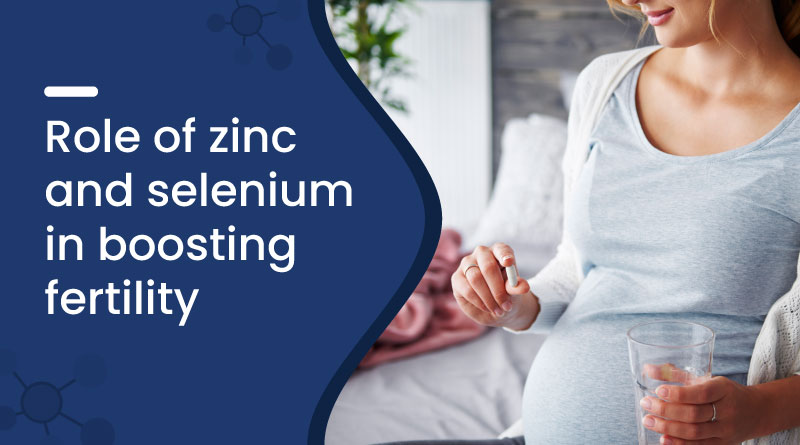Zinc & Selenium for Fertility | Boost Reproductive Health Naturally


Fertility issues affect millions of couples, and nutrients like zinc and selenium play a vital role in reproductive health. These trace minerals are essential for hormonal balance, sperm production, egg quality, and overall fertility. In this blog, we’ll break down the role of zinc and selenium in boosting fertility, how they work, and why maintaining adequate levels is critical for both men and women trying to conceive.
How Does Zinc Help in Boosting Fertility?
Zinc is one of the most important minerals for fertility, especially in men. It is directly involved in testosterone production, sperm count, and sperm motility.
- Maintains hormone levels – Zinc supports healthy testosterone levels, which is crucial for male fertility.
- Improves sperm quality – It enhances the shape, movement, and overall health of sperm.
- Boosts egg quality in women – Zinc helps with follicular development and ovulation.
Zinc deficiency can lead to delayed sexual maturation, poor sperm quality, and lower chances of conception.
How Does Selenium Boost Fertility?
Selenium plays a key role in antioxidant defense, protecting reproductive cells from oxidative stress. It’s vital for both male and female fertility.
- Protects sperm and eggs from damage
- Supports sperm motility and structure
- Essential for thyroid health, which indirectly affects fertility
Low selenium levels are linked to infertility, poor embryo development, and miscarriages in women.
Why Are Zinc and Selenium Important for Male Fertility?
Zinc and selenium support sperm health by boosting testosterone, improving sperm production, and protecting against damage. Deficiencies can lead to low count, poor motility, and higher oxidative stress.
How Do Zinc and Selenium Support Female Fertility?
In women, zinc and selenium regulate hormones, support ovulation, and protect the reproductive system from cellular damage.
- Zinc helps maintain normal estrogen and progesterone levels, critical for ovulation and implantation.
- Selenium protects eggs from oxidative damage and supports early stages of pregnancy.
Both minerals also influence the function of the thyroid gland, which plays a major role in fertility.
Can Zinc and Selenium Deficiencies Reduce Fertility?
Yes, deficiencies in zinc and selenium can significantly affect fertility in both men and women.
- In men, it can cause poor sperm quality, low testosterone, and reduced libido.
- In women, it may result in hormonal imbalances, irregular cycles, and difficulty conceiving.
Maintaining optimal levels through diet or supplements (after medical advice) is crucial for reproductive success.
What Are the Signs of Zinc and Selenium Deficiency?
Look out for these symptoms:
Zinc Deficiency:
-
Hair loss
-
Low libido
-
Weak immunity
-
Slow wound healing
Selenium Deficiency:
-
Fatigue
-
Muscle weakness
-
Brain fog
-
Thyroid issues
If you’re trying to conceive and experience any of these, consider checking your mineral levels.
What Foods Boost Zinc and Selenium for Fertility?
You can naturally boost your zinc and selenium intake with a fertility-friendly diet:
Zinc-Rich Foods:
-
Pumpkin seeds
-
Chickpeas
-
Meat and poultry
-
Dairy products
-
Eggs
Selenium-Rich Foods:
-
Brazil nuts (excellent source)
-
Tuna and salmon
-
Sunflower seeds
Eating a balanced, nutrient-rich diet is key to enhancing reproductive health.
How to Maintain Healthy Levels of Zinc and Selenium?
- Eat a varied, mineral-rich diet
- Avoid excessive alcohol, which reduces absorption
- Consider supplementation only after consulting a doctor
- Get regular blood tests to monitor levels
Balanced nutrition is the foundation of healthy fertility.
Frequently Asked Questions
Q. Can zinc and selenium be taken together for fertility?
A. Yes, they work well together. Both support reproductive health, and their combined antioxidant power protects sperm and egg cells.
Q. How soon do zinc and selenium improve fertility?
A. Usually, 2 to 3 months of consistent intake may show improvements in sperm quality and hormonal balance.
Q. Can excess zinc or selenium cause side effects?
A. Yes, excessive intake can cause nausea, digestive issues, and toxicity. Follow dosage and consult your doctor.
Q. Do zinc and selenium help with female hormonal balance?
A. Absolutely. They support ovulation, menstrual regularity, and maintain healthy estrogen-progesterone levels.
Q. Can a vegetarian diet provide enough zinc and selenium for fertility?
A. Yes, but it requires careful planning. Include legumes, seeds, nuts, and whole grains to meet your needs.
Conclusion
The role of zinc and selenium in boosting fertility is backed by science. These essential minerals improve sperm quality, egg health, hormone balance, and overall reproductive success. Deficiencies can silently hinder conception efforts. Whether you're planning for pregnancy or supporting fertility health, ensure your diet includes adequate zinc and selenium—or consult a healthcare provider for personalized supplementation. Your fertility begins with your
Recent Blogs
Disclaimer : Zeelab Pharmacy provides health information for knowledge only. Do not self-medicate. Always consult a qualified doctor before starting, stopping, or changing any medicine or treatment.
Related Products
Need Medicines Quick?
Share location to check quick delivery serviceability.
Change Location
Location Access Needed
Your location appears to be blocked or disabled.
Please enable the location from your browser or
device settings.

₹ 0
0
Items added
Quick Links
Categories
Our Policies
2026 Copyright By © Zeelab Pharmacy Private Limited. All Rights Reserved
Our Payment Partners

 Added!
Added!
|
|













